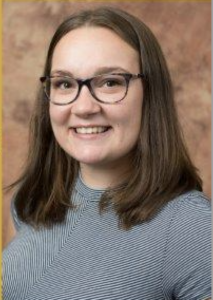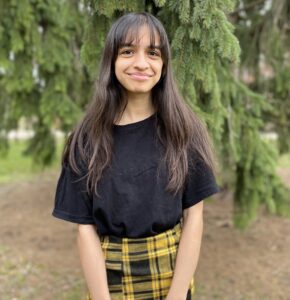Ohio Campus Compact is excited to announce 12 Charles J. Ping Student Service Award Recipients for 2021!
OCC’s Charles J. Ping Student Service Award is designed to recognize and honor undergraduate students for their outstanding leadership and contributions to community service or service-learning on their campus and within their community. These students represent the next generation of civic leaders and problem solvers. The award is named in honor of Charles J. Ping, who served as President of Ohio University from 1975 – 1994. An early supporter and Board Member of Ohio Campus Compact, Ping has been a tireless advocate for campus-community partnerships and increased opportunities for students to become active and engaged citizens.
This recognition is granted annually to undergraduates at Ohio Campus Compact member institutions.
“Many students will participate in volunteerism or community service during college, and some will rise above and stand out in their leadership ability and compassion for others. Ohio Campus Compact is pleased to recognize 12 compassionate leaders with the Charles J. Ping Student Service Award for 2021.” ~Richard Kinsley, Executive Director, Ohio Campus Compact
Students nominated to be a Charles J. Ping Student Service Award winner compete with other nominees from across the state for two $250 Legacy Award mini grants, to be given to a nonprofit organization of the winner’s choice. The Legacy Award mini grants are sponsored by Ohio Campus Compact.
Congratulations 2021 Ping Recipients!

While all Ping awardees show exceptional leadership, initiative and innovation, OCC recognizes Erin Neff and Belkis Moreno as the 2021 Legacy Award winners!

Erin Neff, Baldwin Wallace University
Neuroscience and Psychology, ’21
For as long as I can remember, service has always been a critical part of who I am. From volunteering on mission trips to organizing clothing drives in high school, I knew this identity was one I wanted to carry through my college experience. The second week of my first semester at Baldwin Wallace University, I started a weekly service program teaching kids at a local public library hands-on, accessible nutrition lessons. During my sophomore year, I was accepted into a one-year Brain Center for Community Engagement Fellowship, where I spent the year researching the ins and outs of food insecurity. From there, I attended an Alternative Spring Break Trip to Waco, TX, where we spent a week planting seeds and preparing the farm to start the planting process for the season. While there, I talked to a graduate student who expressed a need for campus meal donation programs. Returning home, I dove in and explored food insecurity rates on campus, spoke to students about hunger, and knew that something needed to change to help my peers thrive. I called dozens of universities around the United States to see how they were handling this issue and proposed that my university join Swipe Out Hunger, the national non-profit fighting student hunger. Now, students with additional meals on their meal plan may rally around one another to donate to students in need. Those who may need additional meals can request extra to be added to their meal plan. In the process, they are connected with the numerous campus and community resources to prosper and feel supported. This program has not only started the fight to end hunger on our campus but has been educational and created a sustainable partnership with many campus offices and students.
While developing Swipe Out Hunger, I lead a team of 10 students on an immersive, alternative break trip to New Orleans surrounding this topic. Currently, I am hosting a 6-week, virtual Alternative Break program dissecting every aspect of food insecurity and its roots. During a service learning course, I was privileged to write and receive a grant for the West Side Community House to fund a suicide prevention conference for parents and children, filled with speakers, activities, and educational opportunities. I am now a course assistant for this class, helping other students write grants for various community partners working to end or remedy the impacts of child maltreatment. While I can talk about these experiences and many more in much greater detail, each has taught me leadership, dedication, commitment, perseverance and fueled my service passion. My service identity in high school planted the seed that blossomed into my identity on campus. My service lens has transformed my word choice and fostered an inclusive environment in my residence hall. As I round out my undergraduate experience, I have applied to medical schools with a service mindset. Here, I can continue harnessing my desire to work with the community and using my voice when my patients may not have one.

Belkis Moreno, Oberlin College
Comparative American Studies, ’22
I first learned about El Centro Volunteer Initiative (ECVI) in my first semester of college. ECVI is a student- led organization that partners with the nonprofit El Centro de Servicios Sociales to offer Citizenship and English classes to the Latinx community in Lorain, Ohio. Coming from Houston, Texas and being Latina myself, I wanted to find a sense of belonging and community in the small town of Oberlin, Ohio, and I knew I would find that through ECVI. I also saw some of my own experiences reflected in ECVI’s work; in high school I helped my mom study for her citizenship exam, and as a daughter of immigrants, I often have to translate for my parents. Through this, I saw my own community reflected in ECVI’s work, and immediately joined.
In my second semester of college, the leaders at the time asked me to become a Program Coordinator with them. It’s been three years since then, and I’ve learned so much about ECVI, El Centro, and Lorain! There are many components and moving parts of ECVI, so while we collaborate with El Centro to make the Citizenship and English classes possible and to get people from Lorain interested, we also recruit volunteers from Oberlin College to be tutors in our classes or be a part of our Grant Writing and Fundraising team. Our board is made up entirely of Oberlin College students, from class instructors to Bonner scholars. Along with volunteers, they help us host fundraisers to help our Citizenship Class students cover the cost of the $725 citizenship application fee.
As a Program Coordinator, I’ve had the privilege to work with Victor Leandry and Anabel Barron, two activists and leading members of El Centro de Servicios Sociales and the Lorain community. By working with them, I’ve learned so much and grown as a person and a leader. Together, we’re able to have Citizenship and English classes, which are extremely difficult for immigrant communities to find in Northeast Ohio. Due to this, we’ve reached people from all over the state for our classes. Since the founding of ECVI in 2017, we’ve helped over 30 ECVI students become citizens!
Additionally, as a Comparative American Studies major, I’ve seen how the work I do in ECVI resembles the discussions and themes in my area of study. While it is important to learn and read about issues such as immigration and lack of resources, ECVI has given me, and other Oberlin students the chance to make a direct impact and contribute to the communities that we learn about in class. Throughout the years, our students always thank us for how much we’ve helped them, but I feel that they’ve given me so much more. Through the connections and friendships, I’ve made, I’ve found a sense of community and home. I feel extremely lucky to be a part of ECVI; to be a part of a community made up by Lorain community leaders, hardworking Oberlin volunteers and board members, and our amazing students.
